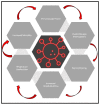Clinical Outcomes in COVID-19 Patients Treated with Immunotherapy
- PMID: 36497435
- PMCID: PMC9735726
- DOI: 10.3390/cancers14235954
Clinical Outcomes in COVID-19 Patients Treated with Immunotherapy
Abstract
Introduction: The full impact of COVID-19 infections on patients with cancer who are actively being treated with chemotherapy or immune checkpoint inhibitors (ICIs) has not been fully defined. Our goal was to track clinical outcomes in this specific patient population. Methods: We performed a retrospective chart review of 121 patients (age > 18 years) at the University of Alabama at Birmingham from January 2020 to December 2021 with an advanced solid malignancy that were eligible to be treated with ICIs or on current therapy within 12 months of their COVID-19 diagnosis. Results: A total of 121 patients were examined in this study, and 61 (50.4%) received immunotherapy treatment within 12 months. One quarter of the patients on ICIs passed away, compared to 13% of the post-chemotherapy cohort. Patients who were vaccinated for COVID-19 had lower mortality compared to unvaccinated patients (X2 = 15.19, p < 0.001), and patients with lower ECOG (0.98) were associated with lower mortality compared to patients with worse functional status (0.98 vs. 1.52; t = 3.20; p < 0.01). Conclusions: COVID-19-related ICI mortality was higher compared to patients receiving chemotherapy. However, ICI cessation or delay is unwarranted as long there has been a risk−benefit assessment undertaken with the patient.
Keywords: COVID-19; cancer; immune checkpoint inhibitors; immunotherapy.
Conflict of interest statement
The authors declare no conflict of interest.
Figures



References
-
- Zhou F., Yu T., Du R., Fan G., Liu Y., Liu Z., Xiang J., Wang Y., Song B., Gu X., et al. Clinical course and risk factors for mortality of adult inpatients with COVID-19 in Wuhan, China: A retrospective cohort study. Lancet. 2020;395:1054–1062. doi: 10.1016/S0140-6736(20)30566-3. - DOI - PMC - PubMed
-
- Tian J., Yuan X., Xiao J., Zhong Q., Yang C., Liu B., Cai Y., Lu Z., Wang J., Wang Y., et al. Clinical characteristics and risk factors associated with COVID-19 disease severity in patients with cancer in Wuhan, China: A multicentre, retrospective, cohort study. Lancet Oncol. 2020;21:893–903. doi: 10.1016/S1470-2045(20)30309-0. - DOI - PMC - PubMed
LinkOut - more resources
Full Text Sources

